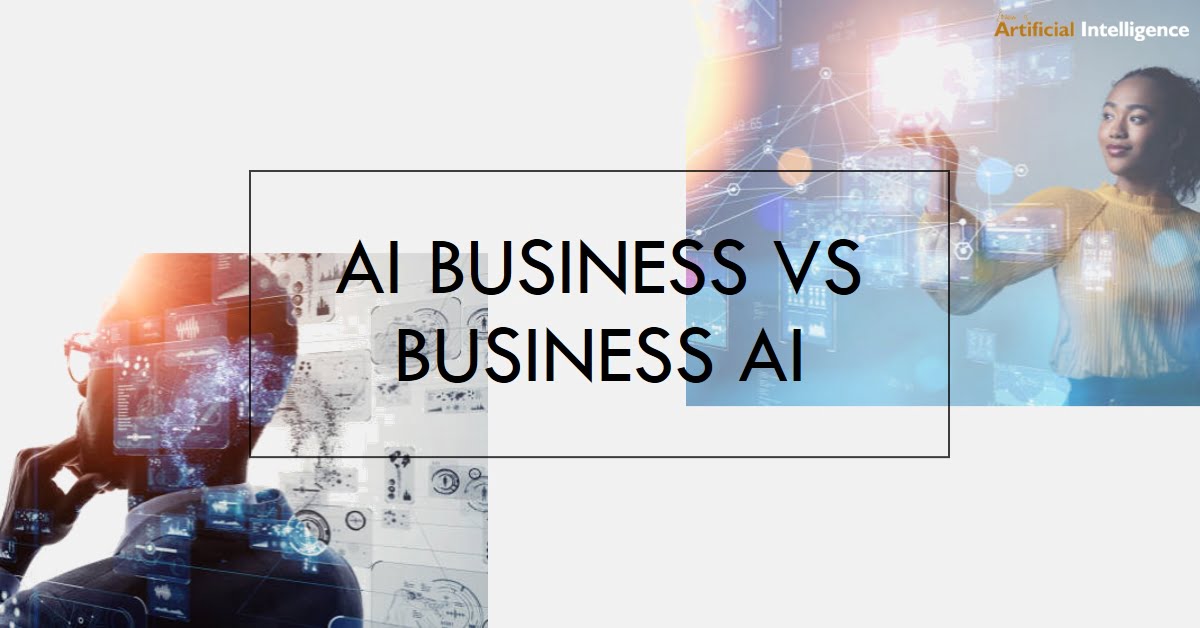AI Business vs Business AI
Table of Contents
In the ever-evolving world of technology, acronyms can unlock new realms of opportunity or leave us hopelessly lost in a maze of confusion. Two such cryptic contenders within the area of artificial intelligence (AI) are “AI Business” and “Business AI.” While they’ll sound like fraternal twins, their underlying principles and implications diverge significantly. Are they competitors vying for dominance or complementary forces fueling an AI revolution? Buckle up, intrepid explorers, as we deeply dive into this fascinating puzzle.

AI Business: The Rise of the AI-Enabled Enterprise
Imagine a company where machines don’t just churn out responsibilities; they actively recognize your customers, predict marketplace developments, and optimize operations. This is the center of the artificial intelligence business. It’s about leveraging AI technology, like system knowledge, to improve computer vision and natural language processing in each facet of an organization, from customer enjoyment to product improvement.
Think of it this way: an artificial intelligence business is like a finely tuned device, with AI acting as the virtuoso conductor. Data fuels the orchestra, flowing through algorithms like sheet music. AI acts as the interpreter, extracting insights and guiding strategic decisions. The result? A symphony of innovation, wherein each is aware, harmonizes to create a competitive advantage.
Here are some critical pillars of an AI business:
- Data-Driven Decision Making: No extra taking pictures in the dark. AI analyses substantial records to uncover hidden patterns, anticipate purchaser conduct, and inform strategic selections.
- Personalized Customer Experiences: Forget one-size-fits-all. AI personalizes interactions, tailors hints and anticipates wishes, building more potent customer relationships.
- Automated Operations and Processes: Robots won’t take over the sector; however, they could unfasten human time. AI automates repetitive obligations, streamlines workflows, and boosts performance.
- Enhanced Product Development: From predicting market traits to optimizing designs, AI fuels innovation, helping businesses create products that resonate with their clients.
Business AI: Equipping Organisations for the AI Age
While AI Business specializes in integrating AI into the centre of an organization, Business AI takes a more holistic approach. It encompasses the gear, structures, and services that empower organizations to harness the energy of AI, irrespective of their industry or technical expertise.
Think of business AI as the virtual Sherpa, guiding agencies through the treacherous terrain of AI implementation. It gives a roadmap for navigating complicated algorithms, choosing the proper tools, and constructing the necessary infrastructure. Business AI offerings include:
- Cloud-based AI systems: democratizing access to modern AI technology, those structures allow corporations to experiment and build AI answers without vast upfront investment.
- Pre-built AI fashions: Skip the floor-up improvement. Business AI gives pre-educated models for particular responsibilities, like photograph reputation or sentiment evaluation, catering to commonplace needs throughout numerous industries.
- Consulting and support offerings: Building an AI solution can be challenging. Business AI gives expert guidance, helping corporations understand their needs, choose the right tools, and enforce successful AI projects.
So, who wins the AI Battle Royale?
Newsflash: It’s not a conflict but a lovely tango! AI Business and Business AI aren’t in opposition; complementary forces are running toward a not-unusual goal: empowering groups to thrive in the AI-pushed destiny.
Here’s the symbiotic dance:
- AI Business relies on Business AI: Organisations leveraging AI Business require the equipment and guidance provided through Business AI to navigate the problematic international AI implementation.
- Business AI prospers on AI Business: The success of business AI platforms and offerings hinges on the growing demand from companies actively embracing AI Business ideas.
Ultimately, the winners are the agencies that understand the synergy between these two ideas and leverage each as a consequence.

A Glimpse into the AI-Powered Future
The fusion of AI in business and business AI promises a revolution throughout industries. Imagine hospitals predicting sickness outbreaks and tailoring treatments with AI, manufacturers optimizing production strains through actual-time data evaluation, and outlets personalizing the buying experience to an uncanny degree. Today, we are sowing the seeds that will shape our future, not just distant visions.
Embracing the Future: A Roadmap for Every Business
Whether you are a tech magnate or a corner shop proprietor, the age of AI is upon us. Here are a few steps you may take to put it together:
- Identify your AI needs. What are your commercial enterprise-demanding situations? What areas ought AI to improve? Before diving into a sea of algorithms, start using information about your unique desires.
- Build your AI foundation: Assess your records infrastructure, expertise pool, and price range. Lay the foundation for a successful AI implementation before trying to build answers.
- Explore business AI assets: Utilise readily available systems, pre-built models, and consulting services to make your AI.
FAQs:
Can I create an AI business without a massive technical crew?
Yes, with business AI services like cloud-based total structures and pre-built fashions, even those with limited AI information can start experimenting and constructing AI solutions.
Which industries are most impacted by the aid of AI in business?
AI is reworking each industry, from healthcare and finance to retail and production. Some of the most common and unusual use instances include:
- Personalized product recommendations in e-trade
- Predictive upkeep in production
- Fraud detection in financial services
- Customer carrier chatbots
- Personalized healthcare suggestions
What are the ethical considerations of AI in business?
As with any influential era, AI raises moral worries around bias, privacy, and process displacement. Corporations must prioritize responsible AI improvement and use, ensuring transparency, equity, and human oversight.
How can I stay up-to-date on today’s traits in AI business and business AI?
Subscribe to relevant newsletters, comply with industry blogs and publications, attend online events and webinars, and hook up with AI professionals and communities to stay abreast of the latest advancements.
What are some demanding situations companies face when adopting AI?
Commonly demanding situations consist of:
- Access to professional AI skills
- Data quality and availability
- Integration of AI with present systems
- Change management and cultural recognition
- Ethical concerns and change management
How can I ensure successful AI adoption in my agency?
Critical factors for achievement encompass:
- Precise business desires and use instances for AI
- Vital statistics, strategy and governance
- Investment in expertise and talent development
- Change management and cultural readiness
- Ethical tips and accountable AI practices
What are the future trends shaping AI business and business AI?
The future of AI Business is likely to be shaped by:
- The increasing democratization of AI tools and systems
- Growth of computing and AI on-premises
- Improvements in natural language processing and conversational AI
- Focus on responsible AI and ethical governance.
- Increased integration of AI with other rising technologies like blockchain and IoT











